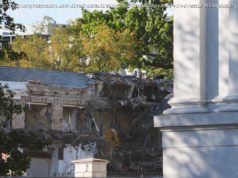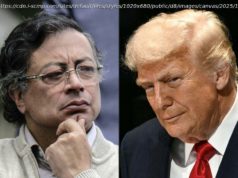Security forces have surrounded Venezuela’s chief prosecutor’s office before a session of the new constitutional assembly that is expected to debate removing the one-time loyalist turne
Security forces have surrounded Venezuela’s chief prosecutor’s office before a session of the new constitutional assembly that is expected to debate removing the one-time loyalist turned arch government critic.
Luisa Ortega denounced what she called a military «siege» on Twitter, publishing photos apparently taken from security cameras showing about 30 national guardsmen in riot gear standing outside her headquarters in Caracas.
Access to the central block where the building is located was completely restricted amid a heavy troop deployment.
The move came as members of the all-powerful constitutional assembly pledged to move quickly against President Nicolas Maduro’s opponents beginning as early as Saturday, when the body meets for the second time.
«Don’t think we’re going to wait weeks, months or years, » former foreign minister Delcy Rodriguez said on Friday after she was voted unanimously by all 545 delegates to lead the assembly. «Tomorrow we start to act. The violent fascists, those who wage economic war on the people, those who wage psychological war, justice is coming for you.»
The constitutional assembly was seated despite strong criticism from the US, other countries and the Venezuelan opposition, which fear the assembly will be a tool for imposing dictatorship.
Supporters say it will pacify a country rocked by violent protests.
Its installation is virtually certain to intensify a political crisis that has brought four months of protests in which at least 120 people have died and hundreds have been jailed.
Mr Maduro vows the assembly will strip opposition legislators of their constitutional immunity from prosecution, while members of congress say they will only be removed by force.
But the opposition is struggling to regain its footing in the face of the government’s strong-arm tactics and the re-emergence of old internal divisions.
Several opposition activists have been jailed in recent days, others are rumoured to be seeking exile and one leader has broken ranks from the opposition alliance to say his party will field candidates in regional elections despite widespread mistrust of Venezuela’s electoral system.
In a sign of its apparent demoralised state, only a few hundred demonstrators showed up for a Friday protest against the constitutional assembly, one of the smallest turnouts in months.
Mr Maduro accuses his opponents of using violence and argues that the constitutional assembly is the best way to restore peace. On Friday he heralded security forces who have been on the front lines of daily street battles, claiming that 580 of them had suffered serious injuries from attacks by «terrorist» protesters.
«I feel deeply the wounds of each one of you, » he said addressing a small group of injured national guardsmen. «With your bodies as your shield, you have defended the right to peace.»
An increasing number of foreign governments have sided with the opposition, refusing to recognise the constitutional assembly and further isolating Mr Maduro’s government.
On Friday the Vatican urged him to suspend the new body, expressing «deep worry for the radicalisation and worsening» of the turmoil in Venezuela.
US President Donald Trump and his French counterpart Emmanuel Macron agreed that Mr Maduro must restore the rights of the Venezuelan people, according to the transcript of a telephone conversation by the White House.






